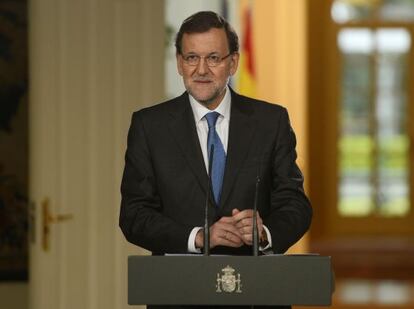Rajoy: “2014 will be the year of the recovery”
Prime Minister looks back on 2013 after Cabinet meeting Rubalcaba: “Everything they have done we will reverse in the next legislature”

Prime Minister Mariano Rajoy addressed the media after the final Cabinet meeting of the year to review 2013, paying particular recognition to the “attitude of all Spaniards in a difficult year” during which the “results of so much effort are starting to be seen.”
“If 2012 was the year of cutbacks and 2013 the year of reforms, 2014 will be the year of recovery,” the prime minister said in a speech focused largely on the economy, and in which the word “abortion” was not uttered once. “The government has taken the decision it wanted,” Rajoy said in answer to an inquiry into the Popular Party’s strict draft abortion reform bill as he straight-batted many of the questions posed by journalists.
One subject on which Rajoy was more than happy to hold forth was Catalonia’s drive for independence from Spain. The prime minister has repeatedly said there will be no negotiation over a referendum the nationalist regional government of Artur Mas has said it will hold next November. Rajoy opined that the process “will damage all of Spain and especially Catalonia.”
“I say yes to dialogue with everybody, but no to dividing Spain,” Rajoy said. “National sovereignty is not something I have at my disposal,” adding that it was impossible to hold such a vote.
Returning to the economy, Rajoy said there has been a “clear change in Spain’s situation” and expressed his certainty that 2014 would witness a drop in unemployment, which remains over 25 percent. The prime minister also highlighted the narrowing of the country’s risk premium to 230 basis points from the dangerously high levels of 2012, a six-percent increase in exports and the 105 billion euros that have been set aside for the government’s Economic Liquidity Fund, “without which many public administrations would have gone bankrupt.”
I say yes to dialogue with everybody, but no to dividing Spain”
On whether or not a cabinet reshuffle may be in the offing ahead of next May’s European elections, the prime minister stated: “I am not ruling anything out […] I don’t want to say anything, because I really haven’t spent a minute on this matter.”
Immediately after the prime minister’s press conference, Socialist leader Alfredo Pérez Rubalcaba provided his own assessment of the year now drawing to a close. “It is the year of the three crises: the economic and social, the political and the territorial,” Rubalcaba said.
In 2013 “there has been unemployment, poverty and inequality,” the leader of the opposition said, adding that his party “will never be glad when things are going badly; neither will we fail to recognize that things are going well,” in reference to the slightly more positive economic data. However, he did warn the government not to “hang medals around your necks that don’t belong to you,” noting that the central bank and European policy have been instrumental in the turnaround.
Speaking about the abortion law recently passed by the Cabinet, Rubalcaba said the only European politician who will have celebrated the text of the reform is Marine le Pen, leader of France’s National Front. “At the moment Spain has recovered two things: inequality and, it seems, a lack of basic freedoms.”
“There are two years left, but the nightmare is nearly over,” the Socialist leader concluded. “What they have done we will reverse in the next legislature.”
Tu suscripción se está usando en otro dispositivo
¿Quieres añadir otro usuario a tu suscripción?
Si continúas leyendo en este dispositivo, no se podrá leer en el otro.
FlechaTu suscripción se está usando en otro dispositivo y solo puedes acceder a EL PAÍS desde un dispositivo a la vez.
Si quieres compartir tu cuenta, cambia tu suscripción a la modalidad Premium, así podrás añadir otro usuario. Cada uno accederá con su propia cuenta de email, lo que os permitirá personalizar vuestra experiencia en EL PAÍS.
¿Tienes una suscripción de empresa? Accede aquí para contratar más cuentas.
En el caso de no saber quién está usando tu cuenta, te recomendamos cambiar tu contraseña aquí.
Si decides continuar compartiendo tu cuenta, este mensaje se mostrará en tu dispositivo y en el de la otra persona que está usando tu cuenta de forma indefinida, afectando a tu experiencia de lectura. Puedes consultar aquí los términos y condiciones de la suscripción digital.








































